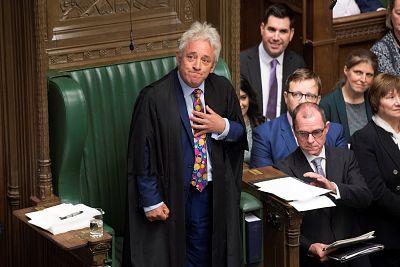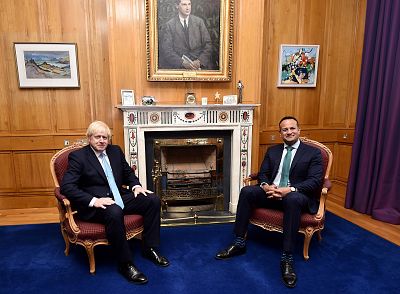After another remarkable day in Parliament, the U.K. is still unsure when the Brexit saga will end.
LONDON — Britain's embattled Prime Minister Boris Johnson suffered yet another political defeat on Monday as he failed for a second time to convince lawmakers to back his call for an election to solve the Brexit deadlock.
Johnson's bid failed, with 293 Members of Parliament supporting the motion, 46 voting against it and multiple abstentions. The prime minister needed two-thirds of support of the House of Commons, at least 434 votes, for the election to take place.
The last-ditch attempt to save him the embarrassment of asking Brussels for an extension to the process of leaving the European Union, Johnson wants voters to back his hard-line "do or die" stance on leaving under any circumstance on Oct. 31. If an extension is granted, it would be the third since the Brexit referendum in 2016.
The next election is scheduled for 2022 — under U.K. law one can only happen before then if two thirds of MPs in the House of Commons approve it.
The House of Commons defeat came as:
• Lawmakers passed a motion compelling the government to release planning documents and private communications no later than 11 p.m. (6 p.m. ET) Wednesday relating to a "no-deal" Brexit, where the U.K. leaves without any ongoing legal agreements with the E.U.
• The government used its executive powers to shut down Parliament, effective from the close of business Monday night, until Oct. 14. This is widely seen as an attempt by Johnson to counteract efforts by his opponents to stop his Brexit plans.
• In another twist, House Speaker John Bercow, who has repeatedly allowed lawmakers to seize control of Parliament's agenda to steer the course of Brexit, stepped down after a decade in the job on Monday.
Introducing the bill, Johnson accused the opposition Labour Party of "preposterous cowardice" for opposing an election.
Jeremy Corbyn, the Labour leader, said: "We're eager for an election. But as keen we are, we're not prepared to risk inflicting the disaster of no deal on our communities, our jobs, our services or indeed our rights."
Johnson wants an election to win back a majority to push his Brexit strategy of taking the U.K. out of the European Union on Oct. 31, with or without a withdrawal agreement to ensure an orderly exit.
But the prime minister's efforts have been thwarted by opposition lawmakers, who don't want to agree to a "snap election" unless they can ensure Johnson can't take Britain out of the E.U. without a deal — which they say will have devastating consequences for the U.K.
Legislation passed by opposition MPs and rebels from Johnson's own Conservative Party last week means Johnson will have to ask for an extension beyond Oct. 31 — although the E.U. also has to agree to any deadline change.
Johnson has said he would rather be "dead in a ditch" than ask for another extension — something that opposition parties say could potentially mean the British prime minister breaking the law.
But a recent string of setbacks has left Johnson increasingly boxed in.
One of his most trusted senior ministers, Amber Rudd, resigned from the Cabineton Sunday over his mishandling of Brexit and the expulsion of 21 members of his own party after they supported an opposition plan to try to block a "no-deal" Brexit last week.
News
Britain's Sunday Times reported in the wake of Rudd's resignation that at least six Cabinet ministers are understood to share her views and at least one is still considering whether to resign as well.
The prime minister's brother, Jo Johnson, quit just days before Rudd last week, saying he was "torn between family loyalty and the national interest."
Finding himself with increasingly fewer cards to play, Boris Johnson was asked last week if he would resign should he be unable to deliver on his promise of abiding by the Oct. 31 Brexit deadline.
"That is not a hypothesis I'm willing to contemplate," he said Friday during a visit to a farm in Scotland.
Earlier on Monday, Johnson had a sudden change of tone, sounding more compromising about the importance of securing a deal.
"I want to find a deal," Johnson said in Dublin, adding that the "no-deal" scenario, while doable, would be "a failure of statecraft for which we would all be responsible."
Johnson traveled to Ireland fortalks with Irish Prime Minister Leo Varadkar on Monday, in the hope of winning concessions on the so-called Irish backstop, an insurance policy designed to stop the return of a hard border between the Irish Republic and Northern Ireland.
The backstop is considered crucial by Ireland, an E.U. member, and undemocratic by English Brexit supporters, for keeping the U.K. subject to European law.













